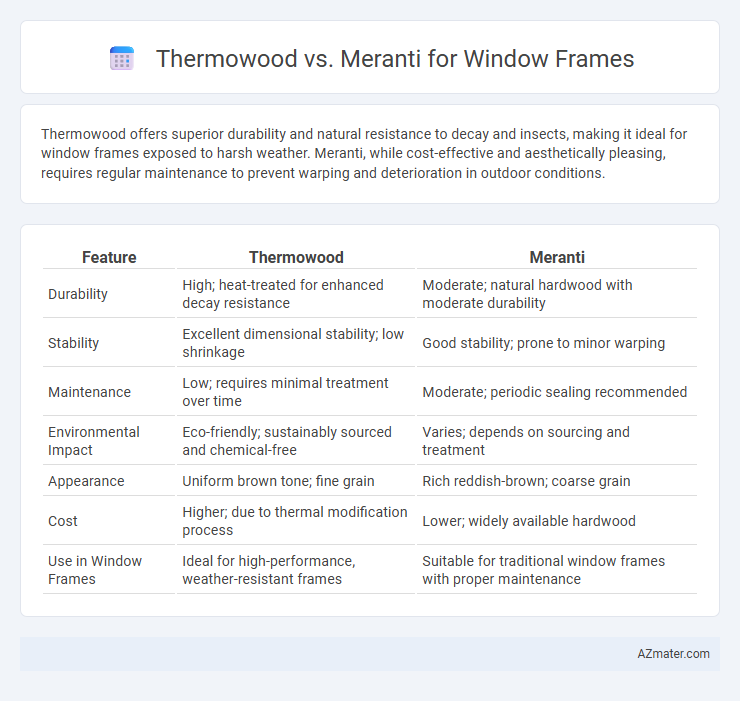Thermowood offers superior durability and natural resistance to decay and insects, making it ideal for window frames exposed to harsh weather. Meranti, while cost-effective and aesthetically pleasing, requires regular maintenance to prevent warping and deterioration in outdoor conditions.
Table of Comparison
| Feature | Thermowood | Meranti |
|---|---|---|
| Durability | High; heat-treated for enhanced decay resistance | Moderate; natural hardwood with moderate durability |
| Stability | Excellent dimensional stability; low shrinkage | Good stability; prone to minor warping |
| Maintenance | Low; requires minimal treatment over time | Moderate; periodic sealing recommended |
| Environmental Impact | Eco-friendly; sustainably sourced and chemical-free | Varies; depends on sourcing and treatment |
| Appearance | Uniform brown tone; fine grain | Rich reddish-brown; coarse grain |
| Cost | Higher; due to thermal modification process | Lower; widely available hardwood |
| Use in Window Frames | Ideal for high-performance, weather-resistant frames | Suitable for traditional window frames with proper maintenance |
Introduction to Thermowood and Meranti
Thermowood is a sustainable, heat-treated softwood that offers enhanced durability, dimensional stability, and resistance to decay, making it ideal for window frames exposed to varying weather conditions. Meranti, a tropical hardwood primarily sourced from Southeast Asia, is known for its strength, rich reddish-brown color, and moderate resistance to moisture, often used in traditional and high-end window frame applications. Both materials provide distinct benefits, with Thermowood excelling in environmental performance and Meranti valued for its natural hardness and aesthetic appeal.
Key Differences Between Thermowood and Meranti
Thermowood is a heat-treated softwood known for superior dimensional stability, enhanced durability, and resistance to rot and insects, making it ideal for window frames in harsh climates. Meranti, a dense tropical hardwood, offers natural strength and attractive grain patterns but is more susceptible to moisture-related issues without proper sealing. The key differences include Thermowood's eco-friendly processing, improved insulation properties, and consistent performance, whereas Meranti is valued for its aesthetic appeal and traditional hardwood characteristics.
Durability and Lifespan Comparison
Thermowood window frames offer enhanced durability due to their heat-treated process, which increases resistance to moisture, decay, and insect damage, resulting in a typical lifespan of 25-30 years. Meranti wood, known for its naturally dense and hard properties, provides a durable frame but tends to have a shorter lifespan of around 15-20 years under similar environmental conditions. Thermowood's improved dimensional stability and resistance to weathering make it a superior choice for longer-lasting window frames compared to Meranti.
Weather Resistance Performance
Thermowood offers superior weather resistance for window frames due to its heat-treated process that enhances durability and moisture resistance, preventing warping and decay in harsh climates. Meranti, while a popular hardwood for window frames, is more susceptible to moisture absorption and may require frequent maintenance to withstand weather exposure. The thermal modification in Thermowood significantly improves dimensional stability and longevity, making it a preferred choice for weather-prone environments.
Maintenance Requirements
Thermowood window frames require minimal maintenance due to their heat-treated process, which enhances durability and resistance to rot, insects, and moisture, making periodic cleaning and occasional sealing sufficient. Meranti window frames demand more frequent upkeep, including regular sanding and resealing, to prevent decay and insect damage in humid environments. The superior stability and weather resistance of Thermowood contribute to longer intervals between maintenance compared to the more maintenance-intensive Meranti wood.
Sustainability and Environmental Impact
Thermowood is a sustainable option for window frames due to its heat-treated modification process that enhances durability without chemical additives, ensuring longevity and reducing resource consumption. Meranti, sourced from tropical hardwood forests, often faces sustainability concerns linked to deforestation and habitat loss, although certified sources like FSC can mitigate environmental impacts. Choosing Thermowood supports eco-friendly construction with lower carbon footprint and longer life cycle, whereas Meranti's environmental impact varies widely based on harvesting practices.
Thermal Insulation Properties
Thermowood offers superior thermal insulation properties compared to Meranti, due to its modified wood structure that reduces moisture content and enhances dimensional stability. Its heat-treated process creates a highly resistant cellular structure that significantly lowers heat transfer, making Thermowood an energy-efficient choice for window frames. In contrast, Meranti, being a tropical hardwood, has higher thermal conductivity, resulting in less effective insulation and greater heat loss through window frames.
Cost Comparison: Thermowood vs Meranti
Thermowood window frames typically cost more upfront than Meranti due to the specialized thermal modification process that enhances durability and resistance to decay. Meranti, a popular tropical hardwood, offers a lower initial purchase price but may incur higher maintenance costs over time because it is less resistant to moisture and insect damage. Considering long-term value, Thermowood's investment can reduce expenses related to repairs and replacements compared to Meranti in window framing applications.
Aesthetic Appeal and Design Flexibility
Thermowood offers a modern aesthetic appeal with its uniform color and smooth texture, making it ideal for contemporary window frame designs. Meranti boasts a rich, natural grain and warm reddish hues that provide a classic and luxurious look, enhancing traditional or colonial-style windows. Design flexibility is greater in Thermowood due to its engineered stability and ease of machining, allowing for intricate patterns and custom shapes not easily achieved with Meranti.
Conclusion: Choosing the Right Wood for Window Frames
Thermowood offers superior durability, enhanced resistance to moisture, and exceptional thermal insulation, making it ideal for window frames in harsh or variable climates. Meranti, with its attractive appearance and affordability, suits interior or less exposed window frames, providing a cost-effective aesthetic solution. Selecting the right wood depends on environmental conditions, budget, and long-term maintenance preferences to ensure optimal performance and longevity of window frames.

Infographic: Thermowood vs Meranti for Window Frame
 azmater.com
azmater.com